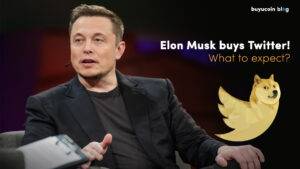Just like any other contracts, Smart Contract state out the terms or rules on agreement. The origin of the phrase ‘Smart Contracts’ dates back to the 20th Century when cryptocurrencies were not born. Ideally, if someone reads the article, they might be familiar with the term ‘Ethereum’ as it is the second cryptocurrency after Bitcoin that came into existence. Both Bitcoin and Ethereum harness the underlying technology of Blockchain.
Ethereum is more than simply a store of money; it also allows other blockchain apps to take advantage of its capabilities. The Ethereum Blockchain has its cryptocurrency, Ether, used to pay for transactions. Consider Ether as the driving force of Ethereum for facilitating transactions on the Ethereum blockchain. It also helps to run the smart contracts on Ethereum seamlessly. Let’s decode the smart contracts together in this blog.
What Is A Smart Contract?
A smart contract is a programmable contract that includes rules and agreements between the buyer and seller that executes once all criteria are met.
Consider a scenario where you wish to purchase a car from your friend or acquaintance. The process appears to be a nightmare, complete with legalities and ownership transfers involving a slew of obnoxious middlemen. When we bring smart contracts into the frame, it will automatically transfer the ownership after transferring funds. It will significantly reduce your time as the process is free from mediators.
Characteristics of Smart Contracts
Smart contracts are written pieces of code that run on their own once all of the requirements are met. Apart from eliminating the middlemen, they have a number of advantages. Smart contracts can monitor performance in real time, resulting in significant cost reductions. They are web-based and run on software code that allows them to process transactions rapidly. This speed will usually save several hours when compared to standard business processes.
Smart contracts are effective and result in more value-generating transactions that process per unit of time. They leave no room for miscommunication and eradicate the communication gaps. The smart contracts’ details are kept permanently and are interchangeable.
They are a reliable source of information since there is no room for manipulation or inaccuracy. It allows gaining tremendous confidence when processing a smart contract. In short, smart contracts lower the cost of transactions, guarantee more security, reduce reliance on untrusted intermediaries, and help turn legal obligations into automated processes.

How Do Smart Contract Works?
Smart contracts date back to 1994 when an American computer scientist named Nick Szabo proposed the concept in his paper. He is also the creator of Bit Gold, virtual money. Smart contracts, according to Szabo, are computerized transaction protocols that carry out the terms of a contract.
After specifying all of the event’s rules and conditions, developers write the code on a blockchain. Like we have if/else statements that operate after fulfilling specific criteria, the same is with smart contracts. If the associated conditions in the contracts are met, then the transaction is ratified, else it will get fortified.
Once the transaction is complete, the blockchain is updated, and the parties involved can view the results. In brief, four processes rules the smart contracts’ working:
- Pre-defining the contract: This stage includes the writing of the rules/conditions in the smart contracts.
- Events: This stage reflects the implementation of the smart contract.
- Execution and the transfer of value: The smart contract is implemented depending on referred conditions.
- Settlement process: After the implementation, the final stage is settling smart contracts.
Benefits of Smart Contract
Smart Contracts possess several benefits that were in charge of widespread adoption in the blockchains.
Secure
Smart Contracts come with inbuilt security as they use cryptographic methods to stop people from altering records.
Transparent
The smart contracts are transparent as the written code is accessible and visible to all the relevant parties. It ensures that anyone sitting from any part of the world can see the smart contract and its use.
Free of third-parties
Smart Contracts do not require a line of pesky intermediaries for the verification process and help save your time.
Near real-time execution
Smart contracts are dependent on the underlying networks’ throughput and congestion. Moreover, they happen simultaneously for every party across participating computers once the requirements are happy.
Autonomous and Decentralized
Smart contracts do not require any other input once they are deployed. They work automatically as per the given code and ensure no one can alter the data.
Accurate -There might be chances of human error while facilitating a transaction, whereas the smart contract is a written pieces of code and reach accuracy in no time.
Current and Future Applications of Smart Contracts
The use of smart contracts took a long road to explore its applicability in every field. Even in our daily lives, we may identify examples of how decentralised apps could have improved the environment.
Social Media
With the growing number of hacking vulnerabilities on multiple platforms, safeguarding one’s identity has become a complete falsehood. Even if you created an identity on social media networks, you never had authority over it because they are all centralised.
For Example – uPort provides decentralized identity management to have control of your data.
Marketplaces
A non-fungible token is a unit of data recorded on the Blockchain that certifies the uniqueness of a digital asset. Creators from all over the world can launch their artwork or song albums as tokens and distribute them to the public.
Example: Zora provides a marketplace to buy NFT in exchange for cryptocurrencies and provides value to the work curated by creators.

Computing Power
In the 21st Century, users have the power to lend their computing power or storage to a stranger in return for some extra bucks. Several projects use smart contracts and do the job of renting your computer storage or power to help you earn easily.
Example: Filecoin does the job of renting your computer storage to people while Golem rents your computing power to help you earn some extra bucks!

Conclusion
Smart contracts are a straightforward replacement for intermediaries from society. It helps to cut down the time and cost and doesn’t require another pair of eyes to stop manipulation. The characteristics, benefits, and applications clearly show why smart contracts are rapidly getting adopted in society.
However, with every technology, there is a potential downside, too, though: people should do their own research. We do not know what the future holds, but preparing for all possible outcomes and adopting new technologies after proper research is all we can do!













